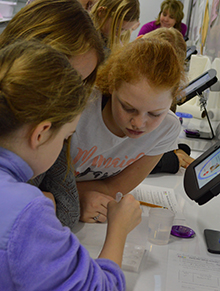Crowded inside a mobile science lab outside Appleview Elementary, fourth-graders discovered how farmers use science to maintain clean water.
Dropping purple food coloring from a pipette into water, then transplanting that water over and over to a more diluted reservoir, they learned how farmers use parts per million (PPM) to measure if a level of contamination is dangerous.
“It’s clear,” a student observed as the pipette lost its purple coloring.

“Just because we can’t see it doesn’t mean it’s not there,” science educator Lindsay Grasman told the students.
Grasman leads a pilot of the mobile FARM program, which has toured Kentwood and Sparta school districts and is now at Murray Lake Elementary in Lowell. It is the brainchild of a group of farmers working with 26 Michigan county farm bureaus, spearheaded by local dairy farmer Renee McCauley.
With its abundance of apple orchards, Sparta is the ideal place for the FARM lab to visit as it prepares to go statewide next fall, McCauley said.
“It’s a type of school that blends the edge of an urban area with the rural setting,” she said. “Hopefully some kids can really identify in some of their own neighborhoods some of the items she’ll be referring to in the lessons.”
Grasman said she hopes students come away with a better understanding of where food comes from, and how it gets to them.
“What do cows make?” Grasman asked students.
In addition to milk, “butter, yogurt, ice cream,” one student rattled off.

Farming Connections Abound
“There’s so many connections to farms in Sparta,” fourth-grade teacher Katherine Ley said as her class filed out of the mobile lab. “There’s so many connections to aunts and uncles, somebody that’s on a farm. If you ask most Sparta kids, they have a connection to somebody on a farm.”
Joining classes throughout the day, retired Appleview teacher Sue Blackall sought to encourage students to apply their learning to action: the expansion of a longtime project, led by Blackall, of planting wildflowers to clean the local watershed. The city has purchased flowers to be planted throughout the downtown area, beginning in May.
As Sparta schools also prepare for renovations from a bond issue passed in 2016, Blackall hopes students understand the importance of retaining local habitat. Because plans from the bond issue involve new buildings, she hopes to to incorporate into the landscape new plants from a rain garden behind Appleview.
“There is room for sports, farming, native plants,” Blackall said. “You just plant them in there. With all of these changes I’m going to need a lot more help. I’m about wearing out that help. It’s in the summer. You can get a million kids, but then summer comes.”
Blackall hopes the FARM lab leads students to spring into action and volunteer during the spring and summer. Wildflowers provide a unique service to the local watershed, she explained.

“Cleaning the water, on top of habitat, is better than just habitat.”
CONNECT









